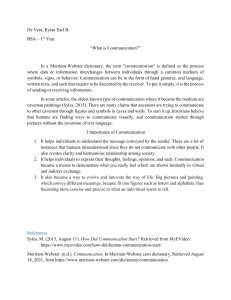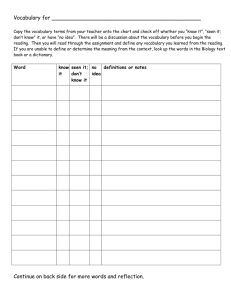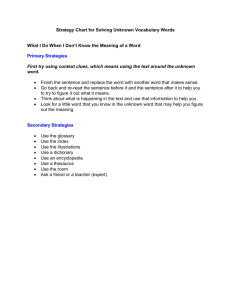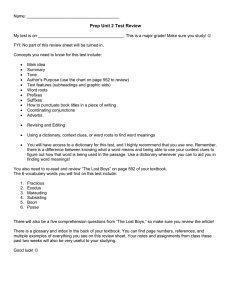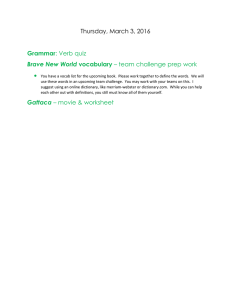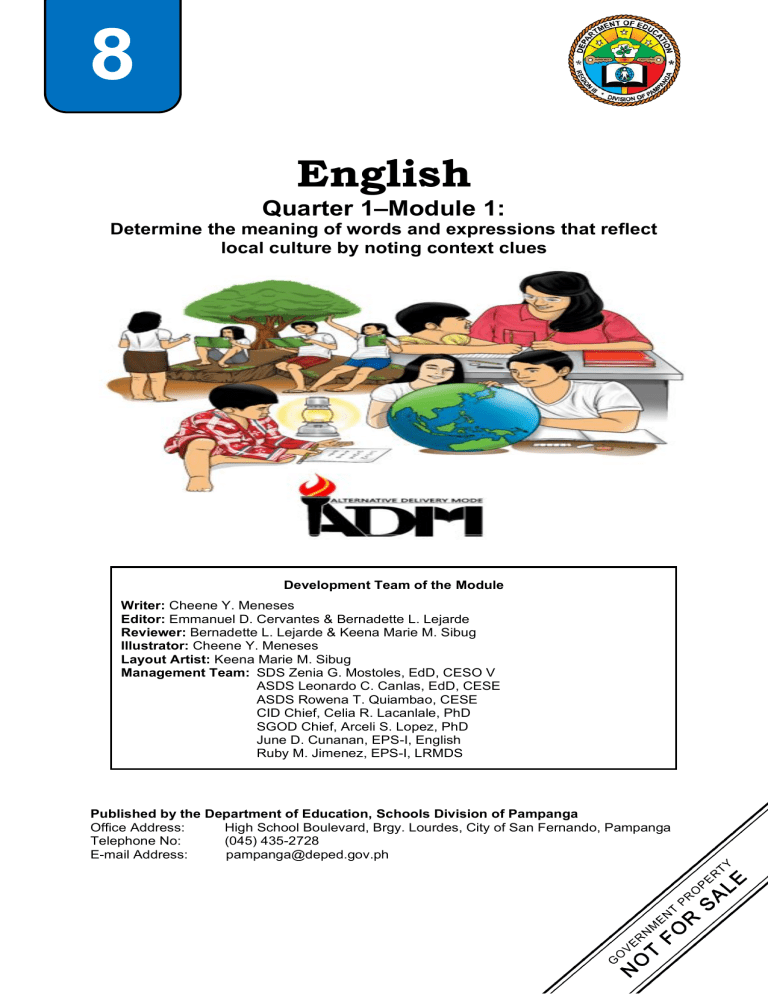
8 English Quarter 1–Module 1: Determine the meaning of words and expressions that reflect local culture by noting context clues Development Team of the Module Writer: Cheene Y. Meneses Editor: Emmanuel D. Cervantes & Bernadette L. Lejarde Reviewer: Bernadette L. Lejarde & Keena Marie M. Sibug Illustrator: Cheene Y. Meneses Layout Artist: Keena Marie M. Sibug Management Team: SDS Zenia G. Mostoles, EdD, CESO V ASDS Leonardo C. Canlas, EdD, CESE ASDS Rowena T. Quiambao, CESE CID Chief, Celia R. Lacanlale, PhD SGOD Chief, Arceli S. Lopez, PhD June D. Cunanan, EPS-I, English Ruby M. Jimenez, EPS-I, LRMDS Published by the Department of Education, Schools Division of Pampanga Office Address: High School Boulevard, Brgy. Lourdes, City of San Fernando, Pampanga Telephone No: (045) 435-2728 E-mail Address: pampanga@deped.gov.ph Introductory Message For the Facilitator: Welcome to the English – 8 Alternative Delivery Mode (ADM) Module on Determining the meaning of words and expressions that reflect the local culture by noting context clues. This module was collaboratively designed, developed and reviewed by educators from public institutions to assist you, the teacher or facilitator in helping the learners meet the standards set by the K to 12 Curriculum while overcoming their personal, social, and economic constraints in schooling. This learning resource hopes to engage the learners into guided and independent learning activities at their own pace and time. Furthermore, this also aims to help learners acquire the needed 21st century skills while taking into consideration their needs and circumstances. In addition to the material in the main text, you will also see this box in the body of the module: Notes to the Teacher This contains helpful tips or strategies that will help you in guiding the learners. As a facilitator, you are expected to orient the learners on how to use this module. You also need to keep track of the learners' progress while allowing them to manage their own learning. Furthermore, you are expected to encourage and assist the learners as they do the tasks included in the module. For the Learner: Welcome to the English – 8 Alternative Delivery Mode (ADM) Module on Determining the meaning of words and expressions that reflect the local culture by noting context clues. A lot of words are unknown to you but this should not hinder you from improving your vocabulary. One must never cease from learning even if there are barriers that hinder the road to success. This module was designed to provide you with fun and meaningful opportunities for guided and independent learning at your own pace and time. You will be enabled to process the contents of the learning resource while being an active learner. What I Need to Know Have you ever experienced reading a text or your favorite book and suddenly encounter a word that is unfamiliar to you? Do unfamiliar words hinder you from understanding what you are reading? If yes, what are some of the techniques that you do to unlock word meanings? There are plenty of ways in improving your word bank. A lot of techniques such as using the internet to find word meaning can be very useful. The use of dictionaries is also one of the most applied techniques to help you handle difficult words. In this module, you will learn another technique in determining word meaning while learning bits of facts about different countries’ local cultures. In order to check your progress, answers are written at the back of this module. In answering this module, you are expected to be honest at all times and be patient in reading and accomplishing your tasks. For the learner We are all individuals aiming to be better in expressing ourselves both orally and written and having oneself familiar with a lot of words and their meanings is of great help in achieving such goal. Please remember not to make any markings on this module and write your answers on your notebook. At the end of this module, you are expected to: 1. share your personal strategy in improving your vocabulary; 2. enumerate what are the strategies in determining the meaning of words and expressions; and 3. find clues in the sentence to determine the meaning of a word. What I Know Choose the correct meaning of the underlined word in each statement. Write the letter of your answer on your notebook. 1. 2. 3. 4. 5. The corona virus disease has now spread to over a large number of countries and was characterized as pandemic by the World Health Organization. a. dangerous disease b. harmless c. prevalent over a whole country or the world The world feels apocalyptic, as news of rising infections all around the world and climbing death tolls envelop us. a. extremely grieving b. glad and hopeful c. showing or describing the total destruction and end of the world, or extremely bad future events Many Filipinos were encouraged to stay at home as strict quarantine measures were observed to slow down the spread of the corona virus disease. a. to access social media b. to socialize c. to isolate or keep oneself away from other people The best way to prevent the transmission of corona virus disease is to wash hands regularly and observe social distancing. a. harmful effects b. spread c. suppress It is believed that until an effective vaccine is found, the new normal is likely to stay indefinitely. a. distinct b. endless c. specific Lesson Determine the meaning of words and expressions that reflect the local culture by noting context clues 12 Sometimes, we do not need to look up the words we don't know. The first thing we need to do is to look at the context and actually try to guess the meaning of the word. Context clues usually help us figure out the meaning of the words without having to look at the dictionary. What’s In There are variety of techniques one can apply in unlocking unfamilar word meanings or expressions. Here are some of them. Copy the table in your notebook and put a check (/) mark in the box if you already used the techniques before. 1. Using of word parts (prefixes, root word, suffixes) 2. Using of reference materials like dictionaries 3. Using of context clues or hints 4. Using of online resources Notes to the Teacher The teacher must consider the prerequisite skills needed in the development of this competency including the schema or background knowledge which may reinforce learning. This module will help the learners bridge the gap of learning to attain mastery of the lesson in its spiral progression. What’s New Now try to read the statement below and look at the underlined word. The Dragon dance is an ancient Chinese tradition which began many years ago. Figure 1https://www.vecteezy.com/free-vector/dragon-dance Can you determine the meaning of the word “ancient” without using a dictionary or online resources? What is the meaning of the word? What strategy did you use to identify its meaning? Now, what do you think are synonyms? What is It Discussion of Activity 1 Finding the meaning of unfamiliar vocabulary is done by choosing flexibly from a range of strategies. One strategy is the use of a variety of reference materials, while another involves applying knowledge of the structure of words and parts of words, such as stems, root words, prefixes, and suffixes. Learning the meaning of a word through its use in a sentence or paragraph is another practical way to build vocabulary, since a dictionary is not always available when a reader encounters an unknown word. A reader should rely on context clues when an obvious clue to meaning is provided, or when only a general sense of the meaning is needed for the reader’s purposes. Context clues are hints found within a sentence, paragraph, or passage that a reader can use to understand the meanings of new or unfamiliar words. a. Tatami mats, which were originally luxury items for nobility, were used by many houses in Japan. “luxury items for nobility” is the definition of “tatami mats” b. Celestial bodies, including the sun, moon, and stars, have fascinated man through the centuries. “Celestial” objects are those in the sky or heavens. c. The Indonesians were able to sail by using their invention which is known as proa. A “proa” is use “to sail”. A “proa” is a “canoe/boat” What’s More Independent Activity 1 Determine the meaning of the underlined word in each sentence by writing the hints or clues on your notebook. Example: a. The mountain pass was a tortuous road, winding and twisting like a snake around the trees of the mountainside. 1. My mother is a frugal person. She never wastes money on unimportant things. 2. Filipinos and Koreans are gregarious people. They are friendly and approachable. 3. The policeman is not gullible enough to easily believe to the suspect’s alibi. 4. They say that Korean actors and actresses are charismatic; most of them are very attractive. 5. My Chinese friend was very thankful when I handed him a gift. He said “xiexie” in a very cheerful voice. Independent Assessment 1 Guess the meaning of the underlined words by matching Column B with Column A. Write the letter of the correct answer on your notebook. Column A 1. The zoo keeper reminded the students not to touch the pernicious animal. 2. The teacher got confused because of the student’s vague answer. 3. Eating nutritious foods is beneficial to your health. 4. Everyone was delighted with the sumptuous meal served by the high class restaurant. 5. No one can stop the inevitable changes happening to the world. a. b. c. d. e. Column B Dangerous; harmful Extremely costly, rich, luxurious, or magnificent Good; advantageous Incapable of being avoided or evaded Indefinite or unclear Independent Activity 2 Identify the meaning of the underlined unfamiliar words by looking for clues in the statement. Write the letter of the correct answer on your notebook from the given words below. a. authoritative d. honor b. command e. huge c. container f. top 1. Shinano was governed by a despotic leader who though a warrior, had a great and cowardly shrinking from anything suggestive of failing health and strength. This caused him to send out a cruel proclamation. The entire province was given strict orders to immediately put to death all aged people. 2. The poor farmer loved his aged mother with tender reverence, and the order filled his heart with sorrow. 3. No one ever thought a second time about obeying the mandate of the governor, so with many deep hopeless sighs, the youth prepared for what at that time was considered the kindest mode of death. 4. Just at sundown, when his day’s work was ended, he took a quantity of unwhitened rice which is principal food for poor, cooked and dried it, and tying it in a square cloth, swung and bundle around his neck along with a gourd filled with cool, sweet water. Then he lifted his helpless old mother to his back and stated on his painful journey up the mountain. 5. One path or another, it mattered not. On he went, climbing blindly upward – ever upward towards the high bare summit of what is known as Obatsuyama, the mountain of the “abandoning of aged”. Independent Assessment 2 For each underlined word, use the context clues or the words that surround it to find the meaning. Choose your answer from the words in parentheses. Write your answer on your notebook. The water-clock marks the hour in the Tachungsz’, in the Tower of the Great Bell: now the mallet is lifted to smite the lips of the metal monster. 1. A mallet is _______ (a hammer, an axe, 2. To smite is to _______ (hit, touch, a saw) caress) All the little dragons on the high-tilted eaves of the green roofs shiver to the tips of their gilded tails under that deep wave of sound. 3. Shiver means to _______(to fall on one’s knees, to tremble at the loud sound, to run away) All the green-and-gold tiles of the temple are vibrating; the wooden goldfish above them are writhing against the sky. 4. writhing means ________ (twisting, pointing, leading) Therefore, the worthy mandarin Kouan-Yu assembled the master-moulders and the renowned bell smiths of the empire, and all men of great repute and cunning in foundry work. 5. cunning means _______ (innocent, expert, skillful) Independent Activity 3 Determine the meaning of each word by using context clues. Write the letter of your answer on your notebook. 1. Katie appeared infallible in math class because she had never gotten a problem wrong. The word infallible in this sentence means a. Incorrect c. Never wrong b. Mistaken d. Wrong 2. The tornado annihilated the whole town to the point that nothing was left standing. The word annihilated in this sentence means a. Constructed c. Destroyed d. Saved b. Created 3. We could tell by the rotten smell, that something putrid was in our trash can. The word putrid in this sentence means a. Alive c. Appealing b. Ample d. Rotten 4. Phyllis felt elated when she won the race. The word elated in this sentence means ____________. a. Happy c. Sick b. Miserable d. Tired e. 5. The insidious burglar was able to sneak into the house without being heard or seen. The word insidious in this sentence means a. Clumsy c. Sneaky b. Loud d. Strong Independent Assessment 3 Read the text inside the box. Guess the meaning of some words found in the selection by getting context clues. Write the letter of the correct answer on your notebook. THE LITERATURE OF MYANMAR The literature of Myanmar, formerly Burma, has a long history. The Mayazedi inscription (A.D. 1113) is the earliest extant specimen of Burmese literature. It narrates the dedication of the Golden Buddha by a prince and the gift of slave-villages to the image, ending with a prayer for the donor and his friends. Over a thousand such dedicatory inscriptions were set up in the next 700 years, containing eloquent poems and prayers of poetic merit. In the fifteenth century up to the nineteenth century, palmleaf (scratched with a stylus) and folded-paper literature became common. Such works were filled with Buddhist piety and courtly refinement of language. The authors were monks, educated courtiers, and court poetesses. Prose works during this period were few, mostly Buddhist scriptures and chronicles of kings. Poetry was varied: there were historical ballads, panegyric odes, the pyo (Buddhist story in verse), and the ya-du (poems of love or nature). The writers also used the “mixed style” or prose and poetry together. Examples of this are the Yagan, a serio-comic epic, and the Myil-Ta-za, a letter of an abbot to the king. Words 1. extant specimen 2. dedicatory inscriptions Meanings a. Existing b. faith; devotion 3. eloquent poems 4. educated courtiers 5. Buddhist piety c. one in attendance at a royal court d. vividly or movingly expressive or revealing e. written on or engraved into a surface What I Have Learned Complete the statement below using what you have learned from the previous discussion. Write your answers on your notebook. In determining the meaning of words, a variety of techniques can be used and these are (1)_________________, (2)____________, (3)______________, (4)________________ Since a dictionary is not always available when a reader encounters an unknown word, a reader should rely on (5)___________ which are hints found within a sentence, paragraph, or passage that a reader can use to understand the meanings of new or unfamiliar words. Some of the words I learned and will include in my vocabulary bank are: Word 1. 2. 3. 4. 5. meaning 1. 2. 3. 4. 5. What I Can Do Construct your own sentence using the following words on your notebook: 1. pernicious sentence: ____________________________________________ 2. vague sentence: ____________________________________________ 3. beneficial sentence: ____________________________________________ 4. sumptuous sentence: ____________________________________________ 5. inevitable sentence: __________________________________________________ 6. frugal sentence: __________________________________________________ 7. gullible sentence: __________________________________________________ 8. smite sentence: __________________________________________________ 9. elated sentence: __________________________________________________ 10. infallible sentence: __________________________________________________ Assessment Read the short selections and make predictions. Choose the best answer by writing the letter on your notebook. TOWARDS ONE ASIA Historic changes in Asia brought dramatic and sometimes tragic events in the quest for a peaceful and independent life. Even today, in the international relations of the states in the multi-faceted Asian continent, we see the interaction, interlacing, and clashing of diverse factors – historical, political, socio-economic, cultural and psychological. We are aware of the complex problems which the Asian people have inherited from both the distant and the recent past. Among these are the gaps in the levels of economic development of the various countries on the continent, the dependent status of many of them in the system of the world’s capitalist economy, territorial disputes, religious contradictions, ethnic differences, among others. These complicated problems become more acute because of acts of subversion of forces hostile to the peace and freedom of Asian nations. As a result, instability still prevails in the Asian region. 1. What does the word “tragic” mean? A. Heartbreaking C. Progressive B. Joyful D. Success 2. What does the word “diverse” mean? A. Common C. Equal B. Different D. Similar 3. What does the word “complex” mean? A. Complicated C. Few B. Easy D. Unknown 4. What does the word “dispute” mean? A. Consensus C. Harmony B. Disagreement D. Unity 5. What does the word “acute” mean? A. Pleasant C. Slow B. Severe D. Unavoidable “The Sea Mouse” A tiny mouse was born between two bags of corn kernels in a cargo ship’s hold. Her mother had been chased away and had disappeared out of view. Frightened, the baby mouse snuggled between the bags and waited. The waves rocked the vessel gently and she soon fell asleep. A loud horn startled her out of her dreams. The ship stopped, and many voices were heard, along with footsteps going back and forth. The mouse stood still, her heart pounding like a drum roll, until someone lifted up one of the bags and yelled, "Marcos, hand me the broom. I found another mouse!" As he turned to look at the mouse again, she had disappeared. She was already making her way out of the boat, scurrying between people's legs, down the ramp and onto the dock. Someone stepped on her tail, but she managed to escape. The baby mouse stopped running and looked around. The warm sand felt good under her paws. The salty wind blew gently between her ears, carrying dolphins' conversations and seagulls' cries. The mouse could see the ship from far away. She watched as sailors, appearing to be the size of corn kernels, went up and down the ramp, carrying wooden cases and other supplies. The baby mouse realized how hungry she was. She nibbled on a seaweed and spat it back out. She was lucky enough to find a plump, juicy berry to fill up her minuscule stomach. She lingered a bit longer to watch the sunset, reflecting on the sea in a million colors, and then yawned. Using a piece of sea sponge as a pillow, the little mouse snuggled in an empty seashell and drifted off to sleep. That was the beginning of her new life as a sea mouse. 6. What does the word “snuggle” mean? A. Curl up B. Eat C. Jump D. Play 7. What does the word “vessel” mean? A. Airplane B. Bicycle C. Box D. Ship 8. What does the word “startle” mean? A. Calm B. Put to sleep C. Shock/surprise D. Shout 9. What does the word “pounding” mean? A. B. C. D. aching to produce mild sound any of various units of mass and weight to move with or make a heavy repetitive sound 10. What does the word “lift” mean? A. to mix B. to put down C. to throw away position D. to raise from a lower to a higher 11. What does the word “scurrying” mean? A. B. C. D. crawling staying calm moving slowly moving around in an agitated, confused, or fluttering manner 12. What does the word “nibble” mean? A. to throw B. to smell C. to swallow D. to eat or chew in small bits 13. What does the word “plump” mean? A. dried B. fragrant C. slightly fat D. unpleasant 14. What does the word “minuscule” mean? A. Gigantic B. Huge C. Tremendous D. Very small 15. What does the word “yawn” mean? A. B. C. D. lively very much interested full of energy and excitement to open the mouth wide and take a deep breath usually as an involuntary reaction to fatigue or boredom Additional Activities Copy the sentences on your notebook. Determine the meaning of the underlined word in each sentence by encircling the hints or clues. 1. His rancor, or hatred, for socializing resulted in a life of loneliness and boredom. 2. I saw the entomologist, a scientist who studies insects, cradle the giant dung beetle in her palm. 3. The petulant four-year-old had a baby sister who was, on the contrary, not grouchy at all. 4. The philosophy teacher presented the students with several conundrums, or riddles, to solve. 5. If you visit Alaska, you will likely see many glaciers, or slow moving masses of ice. Answer Key What’s More What I Know 1. 2. 3. 4. 5. C C C B B Independent Activity 2 Independent Activity 1 1. 2. 3. 4. 5. 1. 2. 3. 4. 5. Never wastes money Friendly Easily believe Very attractive Thankful A D B C F Independent Assessment 2 Independent Assessment 1 1. 2. 3. 4. 5. Independent Activity 3 1. 2. 3. 4. 5. Never wrong Destroyed Rotten Happy Sneaky Independent Assessment 3 1. 2. 3. 4. 5. A E D C B 1. 2. 3. A E C B D 4. 5. A hammer Hit Tremble at the loud sound Twisting Skillful Assessment 1. A 2. B 3. A 4. B 5. B 6. A 7. D 8. C 9. A 10. D 11. D 12. D 13. C 14. D 15. D References Annie McMahon. “The Sea Mouse”, Letterpile. February 21, 2018. Retrieved July 5, 2020. https://letterpile.com/creative-writing/flashfictionforeveryone Dictionary.cambridge.org .APOCALYPTIC | definition in the Cambridge English Dictionary .Retrieved June 4, 2020. https://dictionary.cambridge.org/us/dictionary/english/apocalyptic EdHelper. Context Clues Worksheets (Context Clues: Explanation). Retrieved June 8, 2020https://www.edhelper.com/language/Context_Clues602.html Englishlinx. Context Clues Worksheet. Retrieved June 7, 2020 https://englishlinx.com/context_clues/#MS LM Gr 8 English. April 2017. Accessed June 8, 2020 file:///C:/Users/pc/Downloads/LM%20Gr%208%20English%20April%2017.pdf Lexia Learning. Context Clues: 5 Fun Activities to Boost Vocabulary Development. Retrieved June 8, 2020 https://www.lexialearning.com/blog/context-clues-5-fun-activities-boost-vocabulary-development Mdc.edu. Context Clues. Retrieved June 8, 2020https://www.mdc.edu/kendall/collegeprep/documents2/context%20cluesrev8192.pdf Merriam-Webster. Retrieved June 4, 2020. https://www.merriam-webster.com/ Merriam-Webster.com Dictionary, s.v. “snuggle,” accessed July 5, 2020, https://www.merriamwebster.com/dictionary/snuggle. Merriam-Webster.com Dictionary, s.v. “vessel,” accessed July 5, 2020, https://www.merriamwebster.com/dictionary/vessel. Merriam-Webster.com Dictionary, s.v. “startle,” accessed July 5, 2020, https://www.merriamwebster.com/dictionary/startle. Merriam-Webster.com Dictionary, s.v. “pound,” accessed July 5, 2020, https://www.merriamwebster.com/dictionary/pound. Merriam-Webster.com Dictionary, s.v. “lift,” accessed July 5, 2020, https://www.merriamwebster.com/dictionary/lift. Merriam-Webster.com Dictionary, s.v. “scurry,” accessed July 5, 2020, https://www.merriamwebster.com/dictionary/scurry. Merriam-Webster.com Dictionary, s.v. “nibble,” accessed July 5, 2020, https://www.merriamwebster.com/dictionary/nibble. Merriam-Webster.com Dictionary, s.v. “plump,” accessed July 5, 2020, https://www.merriamwebster.com/dictionary/plump. Merriam-Webster.com Dictionary, s.v. “minuscule,” accessed July 5, 2020, https://www.merriamwebster.com/dictionary/minuscule. Merriam-Webster.com Dictionary, s.v. “yawn,” accessed July 5, 2020, https://www.merriamwebster.com/dictionary/yawn. Saylordotorg.github. Using Context Clues(Exercise 1). Retrieved June 8, 2020https://saylordotorg.github.io/text_writing-for-success/s08-06-using-context-clues.html Vecteezy. Dragon dance vector graphics. Retrieved June 8, 2020. https://www.vecteezy.com/free-vector/dragondance Vectorstock. boy looking through a magnifying glass. Retrieved June 14, 2020 https://cdn5.vectorstock.com/i/1000x1000/47/04/boy-looking-through-a-magnifying-glass-vector-18164704.jpg For inquiries or feedback, please write or call: Department of Education – Schools Division of Pampanga, Learning Resource Management System High School Boulevard, Brgy. Lourdes, City of San Fernando Pampanga, Philippines 1200 Telephone No: (045) 435-2728 Email Address: pampanga@deped.gov.ph

